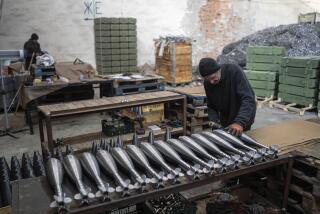Sweden Worries Over Its Arms Industry
- Share via
MALMO, Sweden — For a small neutral country at peace for 175 years, Sweden makes a lot of weapons but its arms industry is worried about the future.
The Swedes build their own jet fighters, naval cruisers and patrol boats, artillery, tanks and anti-tank guns, rifles, laser-guided missiles, explosives, radar--enough weaponry to supply most of its needs.
But the arms makers are worried because of cutbacks in Swedish military spending and escalating production costs. Companies are trimming production and talking about merging.
“It’s been considered part of our security policy to produce weapons systems that are necessary to defend Sweden. But that policy has started to creak at the joints,” said Paul Palsson, president of the state-owned Kockums Marine AB, which builds submarines.
“Sweden is too small a market to carry the arms industry it has. You have to get out and export.”
With a shrinking home market, pressure to export has prompted some big companies to evade regulations banning sales to countries at war or even to regions where conflict is likely.
Two businessmen are on trial for illegal gunpowder exports. Four executives of Bofors AB, the country’s biggest arms producer, face prosecution on charges of selling weapons to Iran and other Persian Gulf states.
The country’s military chief, Supreme Cmdr. Bengt Gustafsson, has said defense policy may have to be redefined, unless the military gets more money.
The defense network can no longer afford to keep the arms industry filled with orders, Gustafsson said. His gloomy reports on the state of the military have triggered one of the biggest defense debates here since World War II.
“It feels unreal to hear the Swedish military talk about more money at a time of international detente,” said Maj-Britt Theorin, a leading member of the governing Social Democratic Party.
Dealing in weapons is a sensitive issue in a nation that champions world disarmament.
But defense has become closely linked to economic goals for Sweden’s welfare state and a population of 8.5 million--full employment, regional development and the well-being of the big companies.
Companies at the heart of Sweden’s civilian export industry also are involved in arms production--Auto Maker Saab-Scania AB also builds airplanes, and Ericsson, the telecommunications giant, also makes sophisticated electronic military hardware.
Weapons makers employ 27,000 people, or almost 3% of the industrial work force. Arms exports account for less than 1% of total foreign business, but they bring enough to keep production lines going.
The stakes are high in major projects such as the development of a new multirole combat plane, the JAS 39 Gripen.
The project, which already has consumed roughly $1.7 billion, is 18 months behind schedule. Estimates of the final cost--around $7 billion--are rising so fast that the plane risks being scrapped.
Gustafsson told a news conference that the project could pay off in the long run, but he added that unless the military got more government money it might have to take the cheaper option and buy an American plane.
Georg Harnsund, head of Saab-Scania, said if the air force cancels the order, it could spell the end of the Swedish aviation industry. That would cost thousands of jobs, many of them in one-industry towns, he said.
Sweden has strict export laws that effectively rule out selling weapons to the countries that use them most.
About 25% of total arms production, mainly ammunition and explosives, is exported, but few of the expensive weapon systems have been sold abroad.
That will have to change if the arms industry is to survive, said Palsson, whose shipbuilders secured a $2.5-billion deal in 1987 to develop a submarine industry in Australia.
More to Read
Sign up for Essential California
The most important California stories and recommendations in your inbox every morning.
You may occasionally receive promotional content from the Los Angeles Times.










